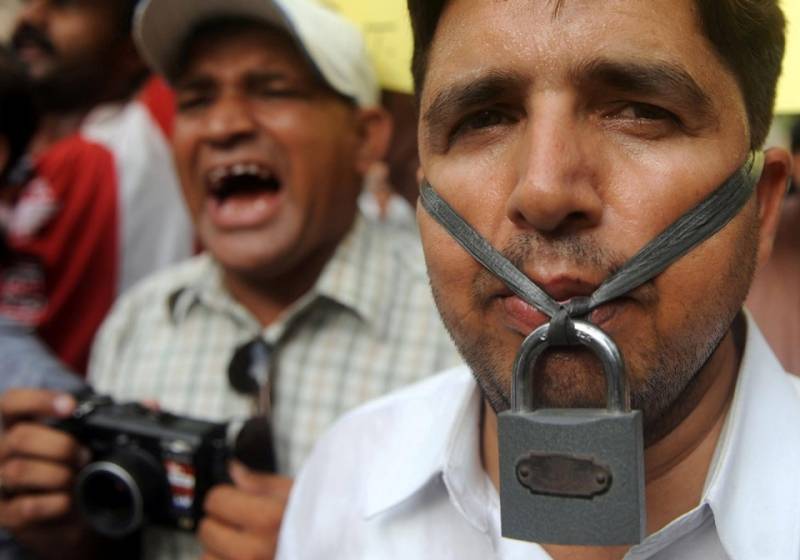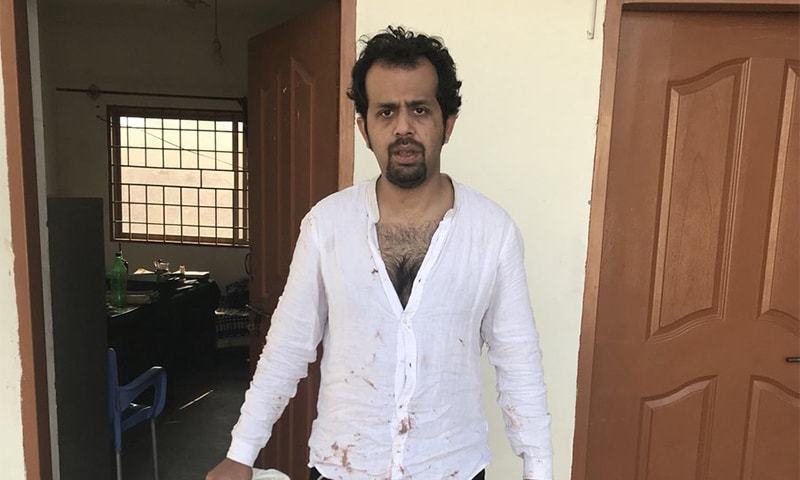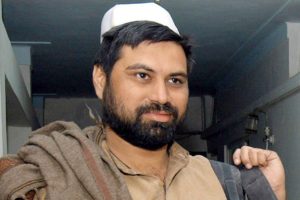
By Suhail Khan Mandokhel
The problems of Pakistan are too broad to be discussed in a single piece. Each problem needs many papers to write on. Of all these problems, the biggest is the absence of fundamental rights conferring freedom of expression. Absence of this fundamental right is in fact the absence of democracy in Pakistan. Supreme body of laws in Pakistan, the 1973 constitution, guarantees all citizens the right to express and criticise under the provisions of Article 19. But this is not the case in reality.
It is not too big a task in Pakistan to criticise civilians and make fun of them with satirical cartoons. The freedom of expression is curbed when it comes to the establishment and religion. When the establishment is asked to realign national interests with the rights and interests of the citizen, we are given a shut-up call, sometimes in the most brutal of manners.
The rise of PTM and state's inability to deal with it peacefully
 But this time, a popular movement under the unassuming leadership of Manzoor Pashteen, who ventured to tell people about the coercive relationship between the state and citizen, is showing mirror to the state about its decades-old policies based on the defective procedure of cause-and-effect. Members of this justice-seeking movement are apparently unmoved by the endless bullying and threatening of the deep state. Given the increasing potentialities of this movement, government is pressurizing media to blackout the political gatherings of PTM. It is owing to the PTM that state-induced censorship of media came to the light and now it is an indisputable point that the media in Pakistan is far from being an independent monitor of human-rights abuses and power.
But this time, a popular movement under the unassuming leadership of Manzoor Pashteen, who ventured to tell people about the coercive relationship between the state and citizen, is showing mirror to the state about its decades-old policies based on the defective procedure of cause-and-effect. Members of this justice-seeking movement are apparently unmoved by the endless bullying and threatening of the deep state. Given the increasing potentialities of this movement, government is pressurizing media to blackout the political gatherings of PTM. It is owing to the PTM that state-induced censorship of media came to the light and now it is an indisputable point that the media in Pakistan is far from being an independent monitor of human-rights abuses and power.
Different modes of censorship and restrictions are being employed by the government in Pakistan to control the processing and dissemination of information.
Visible censorship - The Taha Siddiqui episode
Harassment of journalists is not a newfound tool of government. They are intimidated, harassed and are even subjected to violence. There have been 150 attacks on journalists in the last twelve months. Much to the surprise of outsider, one-third of these attacks has been reported in Islamabad. Through keeping journalists in the instant fear of death, they are forced to adopt self-censorship and those who don’t toe the line are then kidnapped and intimidated. In a recent violent attempt by unidentified men, Taha Saddiqui, an award-winning journalist of France-24, was beaten in Islamabad but somehow managed to escape the deadly assault.

Criminalization of criticism - Journalist in Balochistan placed under fourth schedule
Another tool of direct censorship is criminalization of criticism of top government officials through discriminatory laws. This tool is being widely used in Balochistan to muzzle the critical voices which tend to expose the best-connected land-grabbers backed by the establishment. Recently, a journalist in Balochistan was placed in the fourth schedule list on fake terrorism charges only to remove his name later on the condition of self-censorship.
Under the category of visible censorship also comes the tool of curtailing access to government information. In the complete disregard of international covenant on civil and political rights, Pakistani government has made information kind of gold in the mine and only a handful of seasoned journalists have access to information concerning national defence and foreign policy. It would suffice to say that Pakistan is a captive country where securitization of information is the only norm.
Secutitization of Information
Reports of many fact-finding commissions in Pakistan made to locate responsibilities of different incidents have long been kept under the elusive covers. To name few of them, Hamood-ur-Rehman commission and Abbotabad commission stand protuberant among all.
Cut and paste method of scrapping critical headlines from newspapers is still used under the facade democracy in Pakistan. But for now, this traditional method of censorship is being used against online newspapers through creating paywalls and firewalls on websites of e-papers. Never mind, state of Pakistan is following the suit of China where netizens are deftly kept away from reading dissenting online papers through using state-of-the-art digital technology. An estimated two million censors in China are working to neuter liberal ideas. It is needless to write that Pakistan considers China its role-model and so too, will follow it in the drawing competition of media regulation.
Invisible censorship - Sanna Ejaz fired from PTV
 The defeatist argument that dissent against strong establishment is ineffective and one should live realistically in the system prevails in the media circles. If any journalist raises a contradicting voice, they end up landing into trouble. To quote a latest example, Sana Ejaz has been terminated by Pakistan Television Network under covert pressure for her activism in Pashtun Tahafuz Movement. This example evinces the covert hold of deep state on Pakistani media.
The defeatist argument that dissent against strong establishment is ineffective and one should live realistically in the system prevails in the media circles. If any journalist raises a contradicting voice, they end up landing into trouble. To quote a latest example, Sana Ejaz has been terminated by Pakistan Television Network under covert pressure for her activism in Pashtun Tahafuz Movement. This example evinces the covert hold of deep state on Pakistani media.
More to this point, critical content is being filtered and blocked from the books and newspapers in a vacuous attempt to strangulate the progressive ideation and disputation. Even civil martial law administrator Bhutto did not spare the memoirs of Fatima Jinnah, titled My Brother, and critical comments of M Ali Jinnah about stalwarts of freedom movement were censored in the name of Islam and national interest. This sad story of curbing progressive ideas continues to date.
Articles on PTM dropped from newspapers
A number of articles highlighting the importance of PTM were dropped by leading newspapers due to absurd reasons. Columnist after columnist announced on social media that their writing pieces are not published due to their backing of PTM. Gul Bukhari, Afrasiab Khattak, Talat Hussain and Khan Zaman Kakar informed their tweeps of the state-induced censorship of their columns. This story of invisible censorship is more terrific than meets the eyes.
Those bullying journalists allies of those who abhor democracy
Little wonder that non-state actors living in the unstable state of Pakistan invariably bully journalists and force them to stay the course. Many journalists of tribal areas in particular are made to face repressive measures in the form of abduction and even murder. In the wake of this risks-strewn life of journalists, youth in tribal areas are often advised by their families not to take journalism as a major subject at universities. To make matters worse, religious clerics in tribal areas, who often malign democracy in their speeches delivered at mosque pulpits, take no scruples in explaining freedom of expression as non-negotiable sin in the eye of Islam. For example, a religious scholar of Main Masjid Zhob once remarked patronizingly in his Friday sermon, “Hazrat Saleh (as) and his righteous minority succeeded in the eyes of Allah as opposed to the majority of infidels who Allah destined to face inferno. This tale tells us that democracy is disliked by Allah”. The only way to curb this unchecked indoctrination of extremism is to expose it through progressive media coverage.
Another unaccountable power centre
 Furthermore, an unelected and nearly unaccountable power centre of judiciary is overuse of contempt law to kill the differing opinions. Journalists have been silenced by courts citing ‘anti-judiciary comments’. But these proactive courts have never incriminated any perpetrator involved in the killings of journalists like Saleem Shehzad and Wali Khan Babar. This is the bleak side of our judiciary which nowadays has reshaped itself as a second holy cow after the military. There can be no saner expression about the relationship between free media and judiciary than the one narrated by Raza Rumi in his book ‘Fractious Path – Pakistan’s democratic transition’, “our democratic experience will not evolve if we impede avenues for expression and accountability to the public. A free and independent judiciary can only survive and prosper in a democratic society”.
Furthermore, an unelected and nearly unaccountable power centre of judiciary is overuse of contempt law to kill the differing opinions. Journalists have been silenced by courts citing ‘anti-judiciary comments’. But these proactive courts have never incriminated any perpetrator involved in the killings of journalists like Saleem Shehzad and Wali Khan Babar. This is the bleak side of our judiciary which nowadays has reshaped itself as a second holy cow after the military. There can be no saner expression about the relationship between free media and judiciary than the one narrated by Raza Rumi in his book ‘Fractious Path – Pakistan’s democratic transition’, “our democratic experience will not evolve if we impede avenues for expression and accountability to the public. A free and independent judiciary can only survive and prosper in a democratic society”.
It is high time that the age-old tradition of perpetuating wrong in the name of religion and national security be given up in the long-term interest of the nation. Removal of censorship, that is the first condition of progress, should be actualized without any detrimental delay.
The problems of Pakistan are too broad to be discussed in a single piece. Each problem needs many papers to write on. Of all these problems, the biggest is the absence of fundamental rights conferring freedom of expression. Absence of this fundamental right is in fact the absence of democracy in Pakistan. Supreme body of laws in Pakistan, the 1973 constitution, guarantees all citizens the right to express and criticise under the provisions of Article 19. But this is not the case in reality.
It is not too big a task in Pakistan to criticise civilians and make fun of them with satirical cartoons. The freedom of expression is curbed when it comes to the establishment and religion. When the establishment is asked to realign national interests with the rights and interests of the citizen, we are given a shut-up call, sometimes in the most brutal of manners.
The rise of PTM and state's inability to deal with it peacefully
 But this time, a popular movement under the unassuming leadership of Manzoor Pashteen, who ventured to tell people about the coercive relationship between the state and citizen, is showing mirror to the state about its decades-old policies based on the defective procedure of cause-and-effect. Members of this justice-seeking movement are apparently unmoved by the endless bullying and threatening of the deep state. Given the increasing potentialities of this movement, government is pressurizing media to blackout the political gatherings of PTM. It is owing to the PTM that state-induced censorship of media came to the light and now it is an indisputable point that the media in Pakistan is far from being an independent monitor of human-rights abuses and power.
But this time, a popular movement under the unassuming leadership of Manzoor Pashteen, who ventured to tell people about the coercive relationship between the state and citizen, is showing mirror to the state about its decades-old policies based on the defective procedure of cause-and-effect. Members of this justice-seeking movement are apparently unmoved by the endless bullying and threatening of the deep state. Given the increasing potentialities of this movement, government is pressurizing media to blackout the political gatherings of PTM. It is owing to the PTM that state-induced censorship of media came to the light and now it is an indisputable point that the media in Pakistan is far from being an independent monitor of human-rights abuses and power.Different modes of censorship and restrictions are being employed by the government in Pakistan to control the processing and dissemination of information.
Visible censorship - The Taha Siddiqui episode
Harassment of journalists is not a newfound tool of government. They are intimidated, harassed and are even subjected to violence. There have been 150 attacks on journalists in the last twelve months. Much to the surprise of outsider, one-third of these attacks has been reported in Islamabad. Through keeping journalists in the instant fear of death, they are forced to adopt self-censorship and those who don’t toe the line are then kidnapped and intimidated. In a recent violent attempt by unidentified men, Taha Saddiqui, an award-winning journalist of France-24, was beaten in Islamabad but somehow managed to escape the deadly assault.

Criminalization of criticism - Journalist in Balochistan placed under fourth schedule
Another tool of direct censorship is criminalization of criticism of top government officials through discriminatory laws. This tool is being widely used in Balochistan to muzzle the critical voices which tend to expose the best-connected land-grabbers backed by the establishment. Recently, a journalist in Balochistan was placed in the fourth schedule list on fake terrorism charges only to remove his name later on the condition of self-censorship.
Under the category of visible censorship also comes the tool of curtailing access to government information. In the complete disregard of international covenant on civil and political rights, Pakistani government has made information kind of gold in the mine and only a handful of seasoned journalists have access to information concerning national defence and foreign policy. It would suffice to say that Pakistan is a captive country where securitization of information is the only norm.
Secutitization of Information
Reports of many fact-finding commissions in Pakistan made to locate responsibilities of different incidents have long been kept under the elusive covers. To name few of them, Hamood-ur-Rehman commission and Abbotabad commission stand protuberant among all.
An estimated two million censors in China are working to neuter liberal ideas. It is needless to write that Pakistan considers China its role-model and so too, will follow it in the drawing competition of media regulation.
Cut and paste method of scrapping critical headlines from newspapers is still used under the facade democracy in Pakistan. But for now, this traditional method of censorship is being used against online newspapers through creating paywalls and firewalls on websites of e-papers. Never mind, state of Pakistan is following the suit of China where netizens are deftly kept away from reading dissenting online papers through using state-of-the-art digital technology. An estimated two million censors in China are working to neuter liberal ideas. It is needless to write that Pakistan considers China its role-model and so too, will follow it in the drawing competition of media regulation.
Invisible censorship - Sanna Ejaz fired from PTV
 The defeatist argument that dissent against strong establishment is ineffective and one should live realistically in the system prevails in the media circles. If any journalist raises a contradicting voice, they end up landing into trouble. To quote a latest example, Sana Ejaz has been terminated by Pakistan Television Network under covert pressure for her activism in Pashtun Tahafuz Movement. This example evinces the covert hold of deep state on Pakistani media.
The defeatist argument that dissent against strong establishment is ineffective and one should live realistically in the system prevails in the media circles. If any journalist raises a contradicting voice, they end up landing into trouble. To quote a latest example, Sana Ejaz has been terminated by Pakistan Television Network under covert pressure for her activism in Pashtun Tahafuz Movement. This example evinces the covert hold of deep state on Pakistani media.Even civil martial law administrator Bhutto did not spare the memoirs of Fatima Jinnah, titled My Brother, and critical comments of M Ali Jinnah about stalwarts of freedom movement were censored in the name of Islam and national interest.
More to this point, critical content is being filtered and blocked from the books and newspapers in a vacuous attempt to strangulate the progressive ideation and disputation. Even civil martial law administrator Bhutto did not spare the memoirs of Fatima Jinnah, titled My Brother, and critical comments of M Ali Jinnah about stalwarts of freedom movement were censored in the name of Islam and national interest. This sad story of curbing progressive ideas continues to date.
Articles on PTM dropped from newspapers
A number of articles highlighting the importance of PTM were dropped by leading newspapers due to absurd reasons. Columnist after columnist announced on social media that their writing pieces are not published due to their backing of PTM. Gul Bukhari, Afrasiab Khattak, Talat Hussain and Khan Zaman Kakar informed their tweeps of the state-induced censorship of their columns. This story of invisible censorship is more terrific than meets the eyes.
Those bullying journalists allies of those who abhor democracy
Little wonder that non-state actors living in the unstable state of Pakistan invariably bully journalists and force them to stay the course. Many journalists of tribal areas in particular are made to face repressive measures in the form of abduction and even murder. In the wake of this risks-strewn life of journalists, youth in tribal areas are often advised by their families not to take journalism as a major subject at universities. To make matters worse, religious clerics in tribal areas, who often malign democracy in their speeches delivered at mosque pulpits, take no scruples in explaining freedom of expression as non-negotiable sin in the eye of Islam. For example, a religious scholar of Main Masjid Zhob once remarked patronizingly in his Friday sermon, “Hazrat Saleh (as) and his righteous minority succeeded in the eyes of Allah as opposed to the majority of infidels who Allah destined to face inferno. This tale tells us that democracy is disliked by Allah”. The only way to curb this unchecked indoctrination of extremism is to expose it through progressive media coverage.
Another unaccountable power centre
 Furthermore, an unelected and nearly unaccountable power centre of judiciary is overuse of contempt law to kill the differing opinions. Journalists have been silenced by courts citing ‘anti-judiciary comments’. But these proactive courts have never incriminated any perpetrator involved in the killings of journalists like Saleem Shehzad and Wali Khan Babar. This is the bleak side of our judiciary which nowadays has reshaped itself as a second holy cow after the military. There can be no saner expression about the relationship between free media and judiciary than the one narrated by Raza Rumi in his book ‘Fractious Path – Pakistan’s democratic transition’, “our democratic experience will not evolve if we impede avenues for expression and accountability to the public. A free and independent judiciary can only survive and prosper in a democratic society”.
Furthermore, an unelected and nearly unaccountable power centre of judiciary is overuse of contempt law to kill the differing opinions. Journalists have been silenced by courts citing ‘anti-judiciary comments’. But these proactive courts have never incriminated any perpetrator involved in the killings of journalists like Saleem Shehzad and Wali Khan Babar. This is the bleak side of our judiciary which nowadays has reshaped itself as a second holy cow after the military. There can be no saner expression about the relationship between free media and judiciary than the one narrated by Raza Rumi in his book ‘Fractious Path – Pakistan’s democratic transition’, “our democratic experience will not evolve if we impede avenues for expression and accountability to the public. A free and independent judiciary can only survive and prosper in a democratic society”.It is high time that the age-old tradition of perpetuating wrong in the name of religion and national security be given up in the long-term interest of the nation. Removal of censorship, that is the first condition of progress, should be actualized without any detrimental delay.
